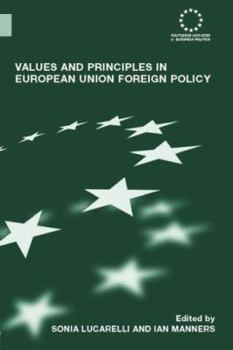Values and Principles in European Union Foreign Policy
This book presents a fresh examination of the values and principles that inform EU foreign policy, exploring the implications of these values and principles on the construction of European Union identity today.
The authors show how current debates on European Union foreign policy and on European identity tend to be kept separated, as if the process of identity formation had only an internal dimension or it was not related to the external behaviour of an international actor. Conceiving EU foreign policy in its broadest context as a set of political actions that are regarded by external actors as 'EU' actions, the book focuses on both Pillar I and Pillar II policies, involving EU and member state actions and material political actions and less material ones such as speech acts.
Adopting a multidisciplinary perspective and drawing on political science, political economy, sociology, environmental science and women's studies, this book will be of great interest to students and scholars of European studies and politics.





